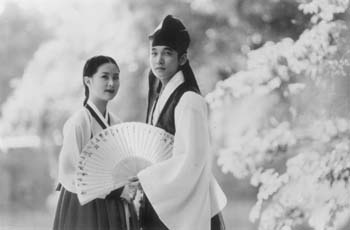![[Metroactive Movies]](/movies/gifs/movies468.gif)
[ Movies Index | Show Times | San Jose | Metroactive Central | Archives ]
 Looking For Love: Lee Hyo Jung (left) and Cho Seung Woo try to keep their passion alive in 'Chunhyang.' Seoul Music A faithful courtesan is the heroine of the Korean film 'Chunhyang' ONE CAN'T overstate the bluesiness of the Korean film Chunhyang. It's a folktale, narrated, sung, danced and growled out in the traditional storytelling form known as pansori. The uncredited Korean griot who starts and ends the tale is accompanied only by a single drummer. He introduces the legend of the hero courtesan Chunhyang (Lee Hyo Jung), who is romanced by a student prince (Cho Seung Woo) and letched after by an evil governor. The pansori grows most emotional during an ordeal scene. The punishing strokes of a cane are counted out (fortunately, they're seen in long shot), and our heroine answers back that every number just reminds her afresh of the love of her man. As the pansori singer preaches the woman's defiance, the filmed audience rises to it, exclaiming, "Yeah!" "Tell it!" "Great God!"--only in Korean. Other moments in Chunhyang display the more frivolous side of the blues. There are double-entendre lyrics about an old man who once was a great ladies' man but can't rise to it any longer and a love song with the verse "If you were a bell, I'd ring you 28 times." We've previously seen this eerie parallel development of music forms, thanks to the documentary Genghis Blues. (A few others might have seen Chunhyang director Im Kwon Taek's 1993 film Sopyonje, a more directly melodramatic story of pansori culture.) As a colorful costume drama filmed in ancient palaces, Chunhyang is as lush as a ripe persimmon. Still the film gets off to a leisurely start, and the early love scenes are heartfelt but insufficiently ardent. The nude scenes earned this film a trip overseas--they didn't give it any passion. In these early sequences, Lee's Chunhyang reminded me of detective Philip Marlowe's complaint about an actress whose laugh, supposedly like silvery bells, really sounded like someone putting away sauce pans. Moreover, the heavy comic relief wasn't a relief; the appeal of the strutting, grimacing servant Pangja (Kim Hak Yong) doesn't export. Though Chunhyang is as universal a story as we get from the East, occasional moments are lost in the translation: the griot sings, "Like the mandarin's duck that lost its love, Chunhyang is heartbroken!" However, the second half heats up beautifully into the tale of selfless endurance with the arrival of the avenging prince in disguise. Impersonating a rude beggar, he first attacks the cruel governor with a scorching verse, which, since the prince is a certified Confucian scholar, is daintily written on a silk scroll. The fatal poem breaks up the ill-gotten pomp of the villain's birthday ceremony. By a long chalk, the best actor in Chunhyang is the courtesan's mother, played by Lee Hae Eun. She gets the last word in, holding her belly in happy pride, shouting, "This is the stomach that bore Chunhyang!" The mother's macha joy shows that Chunhyang is more than just a Korean version of The Rape of Lucrece, about a woman's duty to die before dishonor. And the ritual ending isn't happy-ever-after: it consists of words to the effect that "Well, who knows what happened next." And that's the pragmatic voice of the blues speaking.
Chunhyang (R; 120 min.), directed by Im Kwon Taek, written by Cho Sang Hyun, Kang Hye Yun and Kim Myung Gon, photographed by Jung Il Sung and starring Lee Hyo Jung and Cho Seung Woo, opens Friday at the Towne Theatre in San Jose. [ San Jose | Metroactive Central | Archives ]
|
From the February 1-7, 2001 issue of Metro, Silicon Valley's Weekly Newspaper.
Copyright © 2000 Metro Publishing Inc. Metroactive is affiliated with the Boulevards Network.
For more information about the San Jose/Silicon Valley area, visit sanjose.com.